NURS13139 Term 1: Building Resilience in Nursing - Olivia's Report
VerifiedAdded on 2023/06/10
|8
|2625
|201
Report
AI Summary
This report examines a case study of Olivia, a graduate Registered Nurse, to analyze the organizational, societal, and structural factors impacting her nursing practice, holistic health, well-being, and safety. It identifies factors such as enhanced patient-to-nurse ratios, dissatisfaction with work quality, low leadership, and insufficient support, impacting Olivia's work-life balance and contributing to burnout. The report also explores the impact of social factors, such as limited time with family and friends, on her well-being. Furthermore, it recommends three personal strategies for Olivia: developing strong interpersonal relationships with co-workers, setting boundaries between work and personal life, and building resilience. These strategies are then demonstrated to support safe nursing practice and better management of holistic health and well-being, including the importance of effective communication, stress management, and maintaining a healthy work-life balance. The report highlights the importance of these strategies in mitigating the negative effects of workplace stressors and promoting a supportive work environment. The report concludes by emphasizing the importance of building resilience to adapt to the challenges in her profession and providing effective patient care.
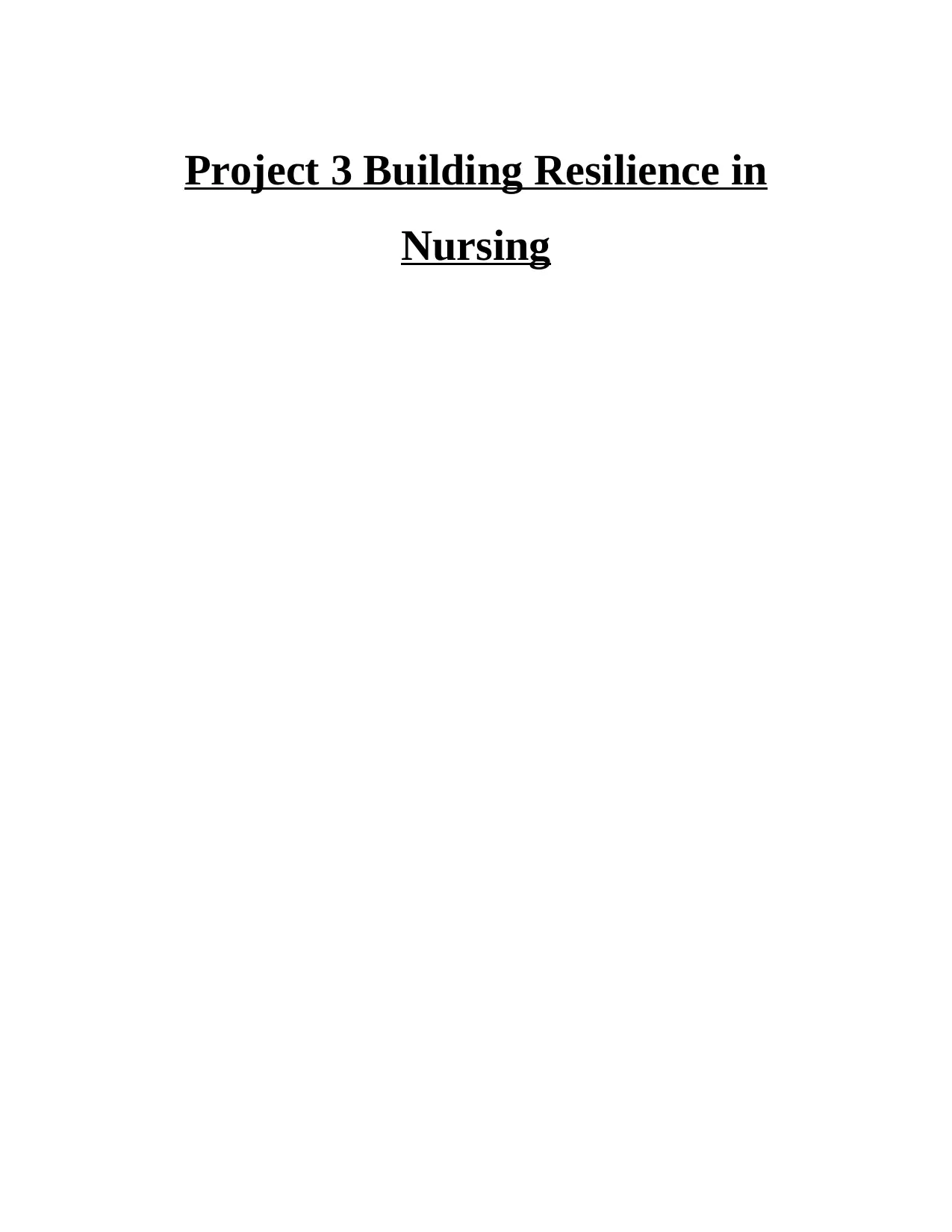
Project 3 Building Resilience in
Nursing
Nursing
Paraphrase This Document
Need a fresh take? Get an instant paraphrase of this document with our AI Paraphraser
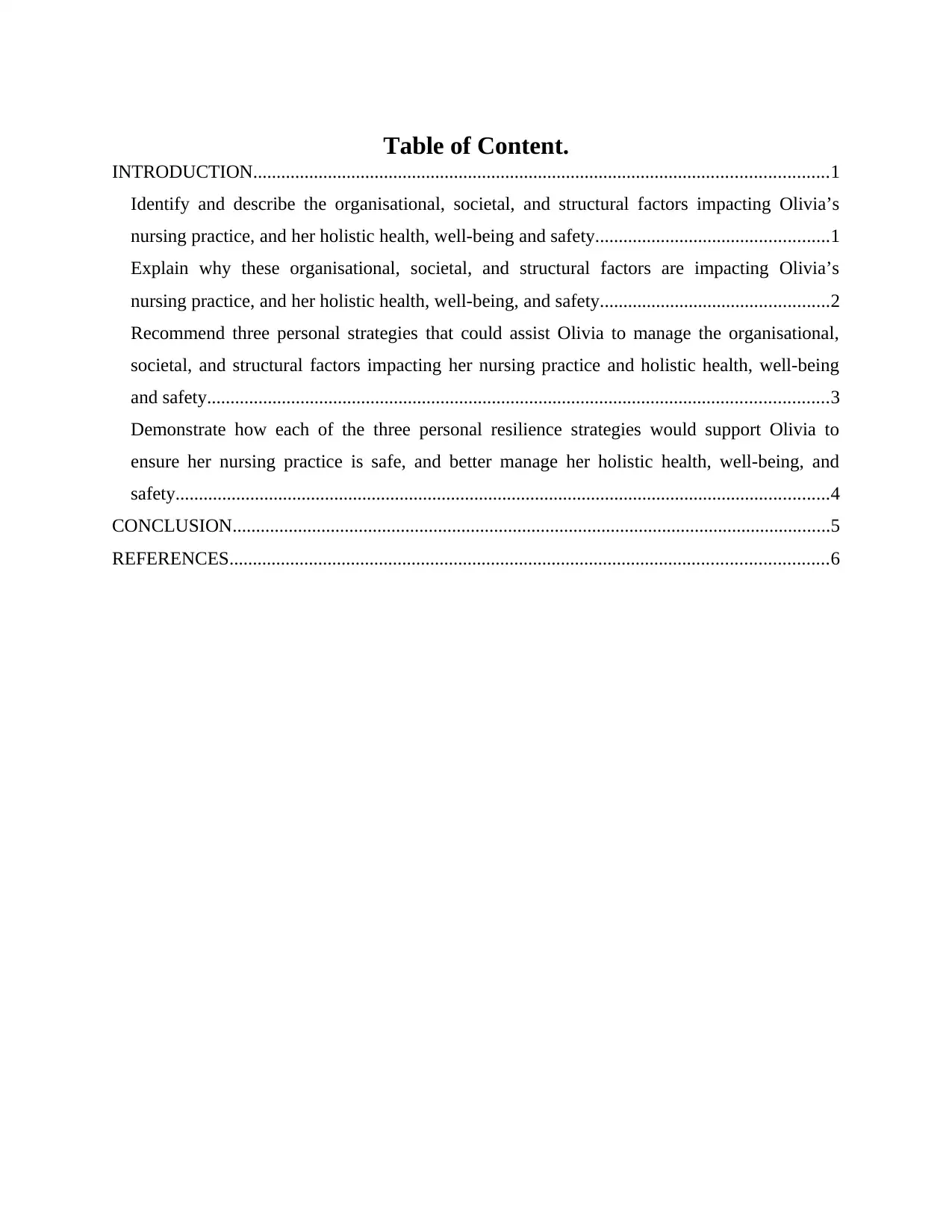
Table of Content.
INTRODUCTION...........................................................................................................................1
Identify and describe the organisational, societal, and structural factors impacting Olivia’s
nursing practice, and her holistic health, well-being and safety..................................................1
Explain why these organisational, societal, and structural factors are impacting Olivia’s
nursing practice, and her holistic health, well-being, and safety.................................................2
Recommend three personal strategies that could assist Olivia to manage the organisational,
societal, and structural factors impacting her nursing practice and holistic health, well-being
and safety.....................................................................................................................................3
Demonstrate how each of the three personal resilience strategies would support Olivia to
ensure her nursing practice is safe, and better manage her holistic health, well-being, and
safety............................................................................................................................................4
CONCLUSION................................................................................................................................5
REFERENCES................................................................................................................................6
INTRODUCTION...........................................................................................................................1
Identify and describe the organisational, societal, and structural factors impacting Olivia’s
nursing practice, and her holistic health, well-being and safety..................................................1
Explain why these organisational, societal, and structural factors are impacting Olivia’s
nursing practice, and her holistic health, well-being, and safety.................................................2
Recommend three personal strategies that could assist Olivia to manage the organisational,
societal, and structural factors impacting her nursing practice and holistic health, well-being
and safety.....................................................................................................................................3
Demonstrate how each of the three personal resilience strategies would support Olivia to
ensure her nursing practice is safe, and better manage her holistic health, well-being, and
safety............................................................................................................................................4
CONCLUSION................................................................................................................................5
REFERENCES................................................................................................................................6
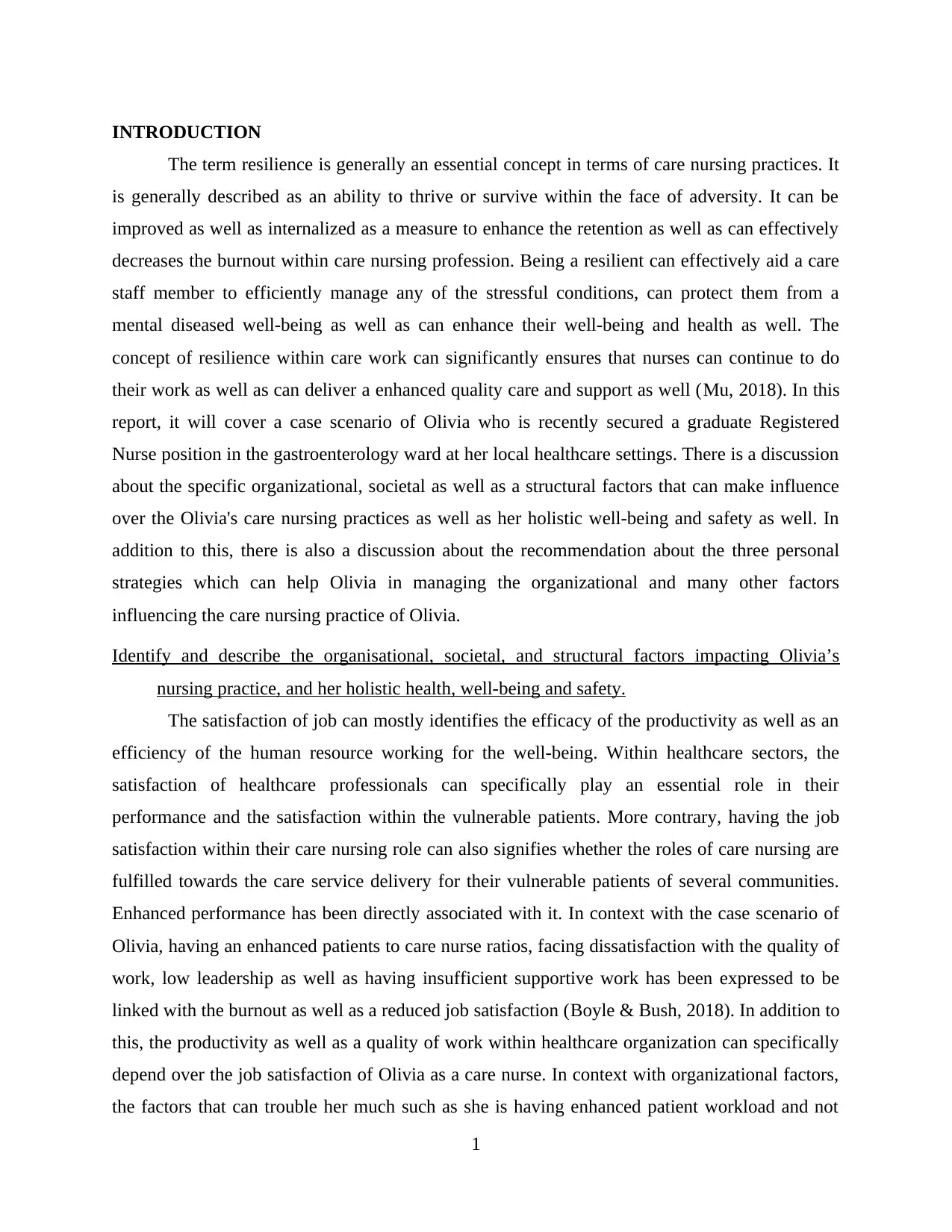
INTRODUCTION
The term resilience is generally an essential concept in terms of care nursing practices. It
is generally described as an ability to thrive or survive within the face of adversity. It can be
improved as well as internalized as a measure to enhance the retention as well as can effectively
decreases the burnout within care nursing profession. Being a resilient can effectively aid a care
staff member to efficiently manage any of the stressful conditions, can protect them from a
mental diseased well-being as well as can enhance their well-being and health as well. The
concept of resilience within care work can significantly ensures that nurses can continue to do
their work as well as can deliver a enhanced quality care and support as well (Mu, 2018). In this
report, it will cover a case scenario of Olivia who is recently secured a graduate Registered
Nurse position in the gastroenterology ward at her local healthcare settings. There is a discussion
about the specific organizational, societal as well as a structural factors that can make influence
over the Olivia's care nursing practices as well as her holistic well-being and safety as well. In
addition to this, there is also a discussion about the recommendation about the three personal
strategies which can help Olivia in managing the organizational and many other factors
influencing the care nursing practice of Olivia.
Identify and describe the organisational, societal, and structural factors impacting Olivia’s
nursing practice, and her holistic health, well-being and safety.
The satisfaction of job can mostly identifies the efficacy of the productivity as well as an
efficiency of the human resource working for the well-being. Within healthcare sectors, the
satisfaction of healthcare professionals can specifically play an essential role in their
performance and the satisfaction within the vulnerable patients. More contrary, having the job
satisfaction within their care nursing role can also signifies whether the roles of care nursing are
fulfilled towards the care service delivery for their vulnerable patients of several communities.
Enhanced performance has been directly associated with it. In context with the case scenario of
Olivia, having an enhanced patients to care nurse ratios, facing dissatisfaction with the quality of
work, low leadership as well as having insufficient supportive work has been expressed to be
linked with the burnout as well as a reduced job satisfaction (Boyle & Bush, 2018). In addition to
this, the productivity as well as a quality of work within healthcare organization can specifically
depend over the job satisfaction of Olivia as a care nurse. In context with organizational factors,
the factors that can trouble her much such as she is having enhanced patient workload and not
1
The term resilience is generally an essential concept in terms of care nursing practices. It
is generally described as an ability to thrive or survive within the face of adversity. It can be
improved as well as internalized as a measure to enhance the retention as well as can effectively
decreases the burnout within care nursing profession. Being a resilient can effectively aid a care
staff member to efficiently manage any of the stressful conditions, can protect them from a
mental diseased well-being as well as can enhance their well-being and health as well. The
concept of resilience within care work can significantly ensures that nurses can continue to do
their work as well as can deliver a enhanced quality care and support as well (Mu, 2018). In this
report, it will cover a case scenario of Olivia who is recently secured a graduate Registered
Nurse position in the gastroenterology ward at her local healthcare settings. There is a discussion
about the specific organizational, societal as well as a structural factors that can make influence
over the Olivia's care nursing practices as well as her holistic well-being and safety as well. In
addition to this, there is also a discussion about the recommendation about the three personal
strategies which can help Olivia in managing the organizational and many other factors
influencing the care nursing practice of Olivia.
Identify and describe the organisational, societal, and structural factors impacting Olivia’s
nursing practice, and her holistic health, well-being and safety.
The satisfaction of job can mostly identifies the efficacy of the productivity as well as an
efficiency of the human resource working for the well-being. Within healthcare sectors, the
satisfaction of healthcare professionals can specifically play an essential role in their
performance and the satisfaction within the vulnerable patients. More contrary, having the job
satisfaction within their care nursing role can also signifies whether the roles of care nursing are
fulfilled towards the care service delivery for their vulnerable patients of several communities.
Enhanced performance has been directly associated with it. In context with the case scenario of
Olivia, having an enhanced patients to care nurse ratios, facing dissatisfaction with the quality of
work, low leadership as well as having insufficient supportive work has been expressed to be
linked with the burnout as well as a reduced job satisfaction (Boyle & Bush, 2018). In addition to
this, the productivity as well as a quality of work within healthcare organization can specifically
depend over the job satisfaction of Olivia as a care nurse. In context with organizational factors,
the factors that can trouble her much such as she is having enhanced patient workload and not
1
⊘ This is a preview!⊘
Do you want full access?
Subscribe today to unlock all pages.

Trusted by 1+ million students worldwide
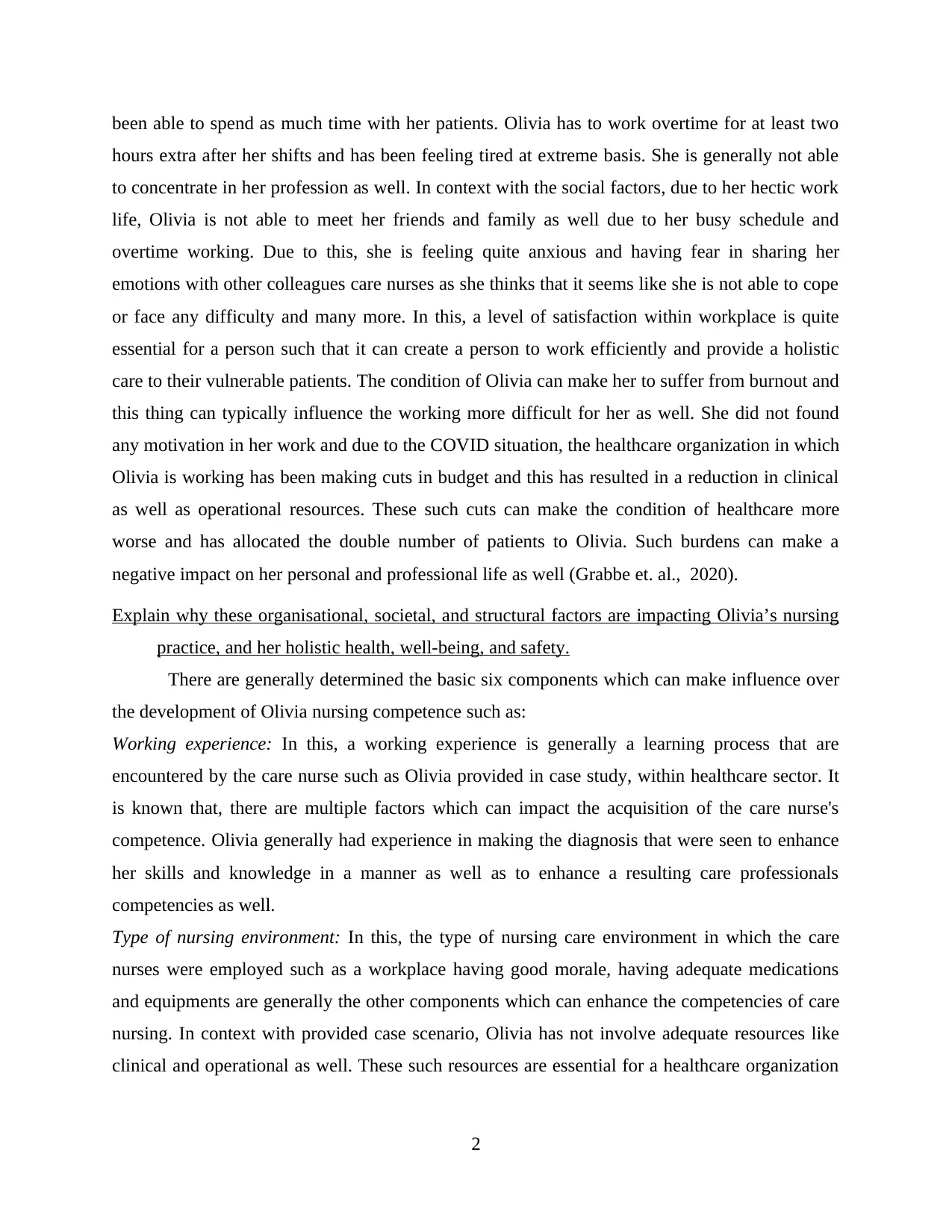
been able to spend as much time with her patients. Olivia has to work overtime for at least two
hours extra after her shifts and has been feeling tired at extreme basis. She is generally not able
to concentrate in her profession as well. In context with the social factors, due to her hectic work
life, Olivia is not able to meet her friends and family as well due to her busy schedule and
overtime working. Due to this, she is feeling quite anxious and having fear in sharing her
emotions with other colleagues care nurses as she thinks that it seems like she is not able to cope
or face any difficulty and many more. In this, a level of satisfaction within workplace is quite
essential for a person such that it can create a person to work efficiently and provide a holistic
care to their vulnerable patients. The condition of Olivia can make her to suffer from burnout and
this thing can typically influence the working more difficult for her as well. She did not found
any motivation in her work and due to the COVID situation, the healthcare organization in which
Olivia is working has been making cuts in budget and this has resulted in a reduction in clinical
as well as operational resources. These such cuts can make the condition of healthcare more
worse and has allocated the double number of patients to Olivia. Such burdens can make a
negative impact on her personal and professional life as well (Grabbe et. al., 2020).
Explain why these organisational, societal, and structural factors are impacting Olivia’s nursing
practice, and her holistic health, well-being, and safety.
There are generally determined the basic six components which can make influence over
the development of Olivia nursing competence such as:
Working experience: In this, a working experience is generally a learning process that are
encountered by the care nurse such as Olivia provided in case study, within healthcare sector. It
is known that, there are multiple factors which can impact the acquisition of the care nurse's
competence. Olivia generally had experience in making the diagnosis that were seen to enhance
her skills and knowledge in a manner as well as to enhance a resulting care professionals
competencies as well.
Type of nursing environment: In this, the type of nursing care environment in which the care
nurses were employed such as a workplace having good morale, having adequate medications
and equipments are generally the other components which can enhance the competencies of care
nursing. In context with provided case scenario, Olivia has not involve adequate resources like
clinical and operational as well. These such resources are essential for a healthcare organization
2
hours extra after her shifts and has been feeling tired at extreme basis. She is generally not able
to concentrate in her profession as well. In context with the social factors, due to her hectic work
life, Olivia is not able to meet her friends and family as well due to her busy schedule and
overtime working. Due to this, she is feeling quite anxious and having fear in sharing her
emotions with other colleagues care nurses as she thinks that it seems like she is not able to cope
or face any difficulty and many more. In this, a level of satisfaction within workplace is quite
essential for a person such that it can create a person to work efficiently and provide a holistic
care to their vulnerable patients. The condition of Olivia can make her to suffer from burnout and
this thing can typically influence the working more difficult for her as well. She did not found
any motivation in her work and due to the COVID situation, the healthcare organization in which
Olivia is working has been making cuts in budget and this has resulted in a reduction in clinical
as well as operational resources. These such cuts can make the condition of healthcare more
worse and has allocated the double number of patients to Olivia. Such burdens can make a
negative impact on her personal and professional life as well (Grabbe et. al., 2020).
Explain why these organisational, societal, and structural factors are impacting Olivia’s nursing
practice, and her holistic health, well-being, and safety.
There are generally determined the basic six components which can make influence over
the development of Olivia nursing competence such as:
Working experience: In this, a working experience is generally a learning process that are
encountered by the care nurse such as Olivia provided in case study, within healthcare sector. It
is known that, there are multiple factors which can impact the acquisition of the care nurse's
competence. Olivia generally had experience in making the diagnosis that were seen to enhance
her skills and knowledge in a manner as well as to enhance a resulting care professionals
competencies as well.
Type of nursing environment: In this, the type of nursing care environment in which the care
nurses were employed such as a workplace having good morale, having adequate medications
and equipments are generally the other components which can enhance the competencies of care
nursing. In context with provided case scenario, Olivia has not involve adequate resources like
clinical and operational as well. These such resources are essential for a healthcare organization
2
Paraphrase This Document
Need a fresh take? Get an instant paraphrase of this document with our AI Paraphraser
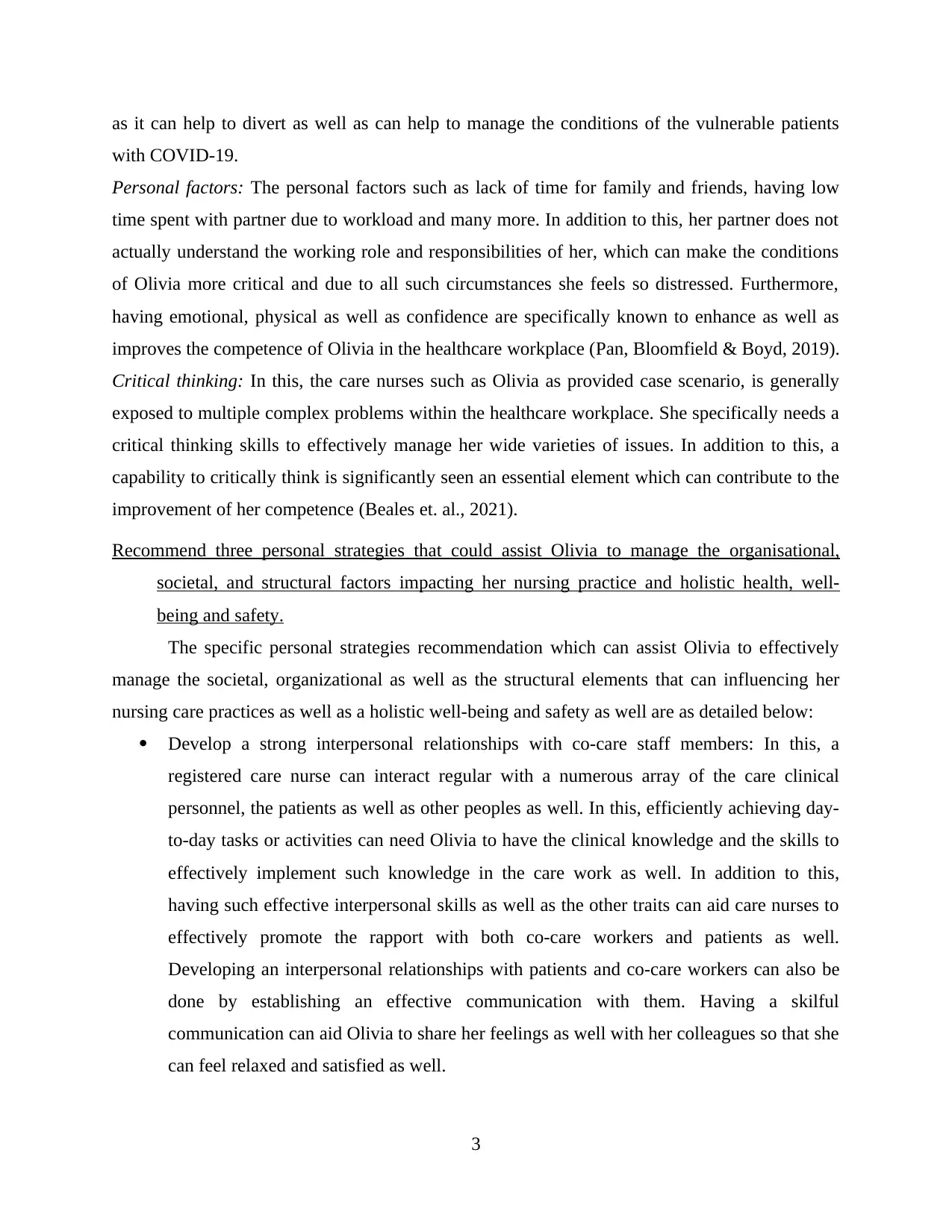
as it can help to divert as well as can help to manage the conditions of the vulnerable patients
with COVID-19.
Personal factors: The personal factors such as lack of time for family and friends, having low
time spent with partner due to workload and many more. In addition to this, her partner does not
actually understand the working role and responsibilities of her, which can make the conditions
of Olivia more critical and due to all such circumstances she feels so distressed. Furthermore,
having emotional, physical as well as confidence are specifically known to enhance as well as
improves the competence of Olivia in the healthcare workplace (Pan, Bloomfield & Boyd, 2019).
Critical thinking: In this, the care nurses such as Olivia as provided case scenario, is generally
exposed to multiple complex problems within the healthcare workplace. She specifically needs a
critical thinking skills to effectively manage her wide varieties of issues. In addition to this, a
capability to critically think is significantly seen an essential element which can contribute to the
improvement of her competence (Beales et. al., 2021).
Recommend three personal strategies that could assist Olivia to manage the organisational,
societal, and structural factors impacting her nursing practice and holistic health, well-
being and safety.
The specific personal strategies recommendation which can assist Olivia to effectively
manage the societal, organizational as well as the structural elements that can influencing her
nursing care practices as well as a holistic well-being and safety as well are as detailed below:
Develop a strong interpersonal relationships with co-care staff members: In this, a
registered care nurse can interact regular with a numerous array of the care clinical
personnel, the patients as well as other peoples as well. In this, efficiently achieving day-
to-day tasks or activities can need Olivia to have the clinical knowledge and the skills to
effectively implement such knowledge in the care work as well. In addition to this,
having such effective interpersonal skills as well as the other traits can aid care nurses to
effectively promote the rapport with both co-care workers and patients as well.
Developing an interpersonal relationships with patients and co-care workers can also be
done by establishing an effective communication with them. Having a skilful
communication can aid Olivia to share her feelings as well with her colleagues so that she
can feel relaxed and satisfied as well.
3
with COVID-19.
Personal factors: The personal factors such as lack of time for family and friends, having low
time spent with partner due to workload and many more. In addition to this, her partner does not
actually understand the working role and responsibilities of her, which can make the conditions
of Olivia more critical and due to all such circumstances she feels so distressed. Furthermore,
having emotional, physical as well as confidence are specifically known to enhance as well as
improves the competence of Olivia in the healthcare workplace (Pan, Bloomfield & Boyd, 2019).
Critical thinking: In this, the care nurses such as Olivia as provided case scenario, is generally
exposed to multiple complex problems within the healthcare workplace. She specifically needs a
critical thinking skills to effectively manage her wide varieties of issues. In addition to this, a
capability to critically think is significantly seen an essential element which can contribute to the
improvement of her competence (Beales et. al., 2021).
Recommend three personal strategies that could assist Olivia to manage the organisational,
societal, and structural factors impacting her nursing practice and holistic health, well-
being and safety.
The specific personal strategies recommendation which can assist Olivia to effectively
manage the societal, organizational as well as the structural elements that can influencing her
nursing care practices as well as a holistic well-being and safety as well are as detailed below:
Develop a strong interpersonal relationships with co-care staff members: In this, a
registered care nurse can interact regular with a numerous array of the care clinical
personnel, the patients as well as other peoples as well. In this, efficiently achieving day-
to-day tasks or activities can need Olivia to have the clinical knowledge and the skills to
effectively implement such knowledge in the care work as well. In addition to this,
having such effective interpersonal skills as well as the other traits can aid care nurses to
effectively promote the rapport with both co-care workers and patients as well.
Developing an interpersonal relationships with patients and co-care workers can also be
done by establishing an effective communication with them. Having a skilful
communication can aid Olivia to share her feelings as well with her colleagues so that she
can feel relaxed and satisfied as well.
3
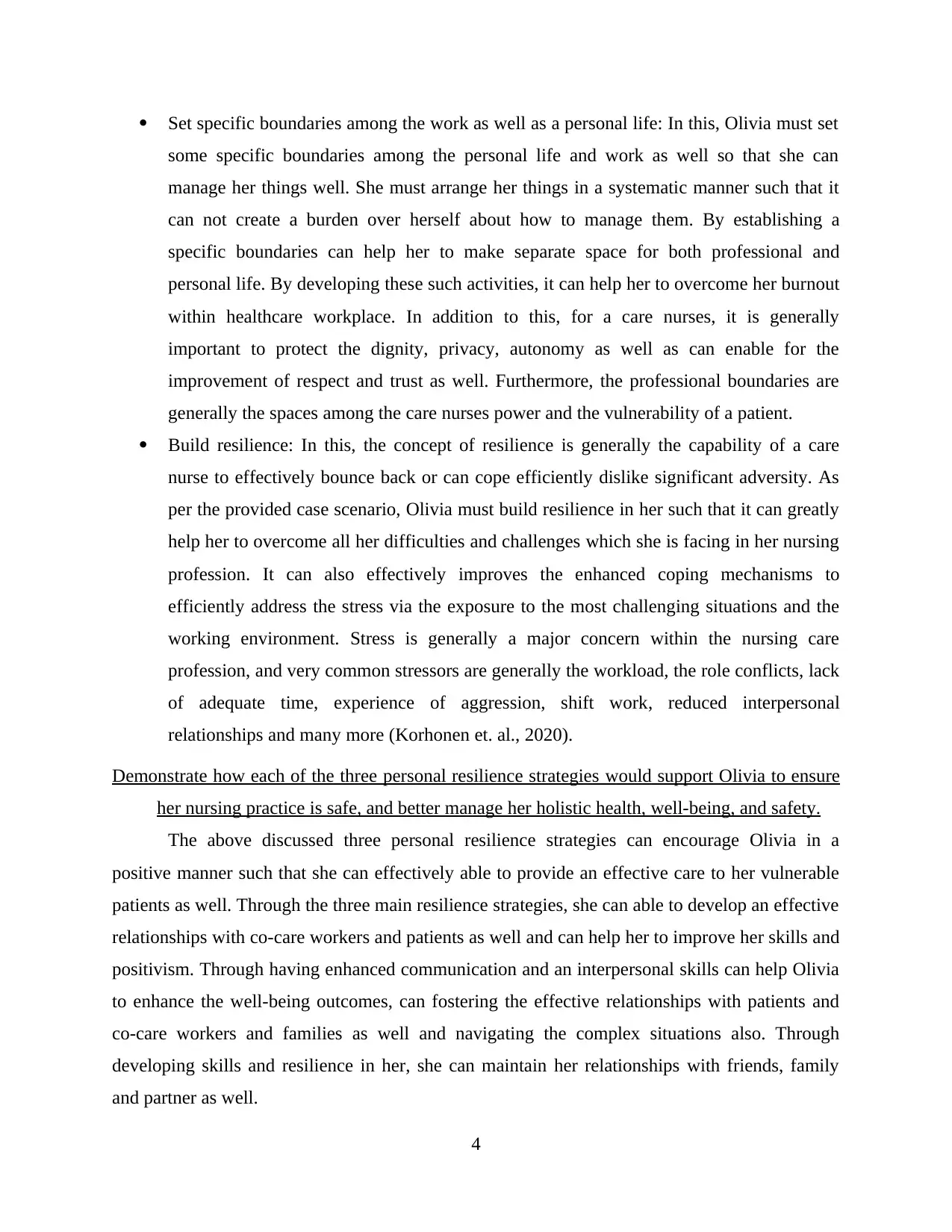
Set specific boundaries among the work as well as a personal life: In this, Olivia must set
some specific boundaries among the personal life and work as well so that she can
manage her things well. She must arrange her things in a systematic manner such that it
can not create a burden over herself about how to manage them. By establishing a
specific boundaries can help her to make separate space for both professional and
personal life. By developing these such activities, it can help her to overcome her burnout
within healthcare workplace. In addition to this, for a care nurses, it is generally
important to protect the dignity, privacy, autonomy as well as can enable for the
improvement of respect and trust as well. Furthermore, the professional boundaries are
generally the spaces among the care nurses power and the vulnerability of a patient.
Build resilience: In this, the concept of resilience is generally the capability of a care
nurse to effectively bounce back or can cope efficiently dislike significant adversity. As
per the provided case scenario, Olivia must build resilience in her such that it can greatly
help her to overcome all her difficulties and challenges which she is facing in her nursing
profession. It can also effectively improves the enhanced coping mechanisms to
efficiently address the stress via the exposure to the most challenging situations and the
working environment. Stress is generally a major concern within the nursing care
profession, and very common stressors are generally the workload, the role conflicts, lack
of adequate time, experience of aggression, shift work, reduced interpersonal
relationships and many more (Korhonen et. al., 2020).
Demonstrate how each of the three personal resilience strategies would support Olivia to ensure
her nursing practice is safe, and better manage her holistic health, well-being, and safety.
The above discussed three personal resilience strategies can encourage Olivia in a
positive manner such that she can effectively able to provide an effective care to her vulnerable
patients as well. Through the three main resilience strategies, she can able to develop an effective
relationships with co-care workers and patients as well and can help her to improve her skills and
positivism. Through having enhanced communication and an interpersonal skills can help Olivia
to enhance the well-being outcomes, can fostering the effective relationships with patients and
co-care workers and families as well and navigating the complex situations also. Through
developing skills and resilience in her, she can maintain her relationships with friends, family
and partner as well.
4
some specific boundaries among the personal life and work as well so that she can
manage her things well. She must arrange her things in a systematic manner such that it
can not create a burden over herself about how to manage them. By establishing a
specific boundaries can help her to make separate space for both professional and
personal life. By developing these such activities, it can help her to overcome her burnout
within healthcare workplace. In addition to this, for a care nurses, it is generally
important to protect the dignity, privacy, autonomy as well as can enable for the
improvement of respect and trust as well. Furthermore, the professional boundaries are
generally the spaces among the care nurses power and the vulnerability of a patient.
Build resilience: In this, the concept of resilience is generally the capability of a care
nurse to effectively bounce back or can cope efficiently dislike significant adversity. As
per the provided case scenario, Olivia must build resilience in her such that it can greatly
help her to overcome all her difficulties and challenges which she is facing in her nursing
profession. It can also effectively improves the enhanced coping mechanisms to
efficiently address the stress via the exposure to the most challenging situations and the
working environment. Stress is generally a major concern within the nursing care
profession, and very common stressors are generally the workload, the role conflicts, lack
of adequate time, experience of aggression, shift work, reduced interpersonal
relationships and many more (Korhonen et. al., 2020).
Demonstrate how each of the three personal resilience strategies would support Olivia to ensure
her nursing practice is safe, and better manage her holistic health, well-being, and safety.
The above discussed three personal resilience strategies can encourage Olivia in a
positive manner such that she can effectively able to provide an effective care to her vulnerable
patients as well. Through the three main resilience strategies, she can able to develop an effective
relationships with co-care workers and patients as well and can help her to improve her skills and
positivism. Through having enhanced communication and an interpersonal skills can help Olivia
to enhance the well-being outcomes, can fostering the effective relationships with patients and
co-care workers and families as well and navigating the complex situations also. Through
developing skills and resilience in her, she can maintain her relationships with friends, family
and partner as well.
4
⊘ This is a preview!⊘
Do you want full access?
Subscribe today to unlock all pages.

Trusted by 1+ million students worldwide
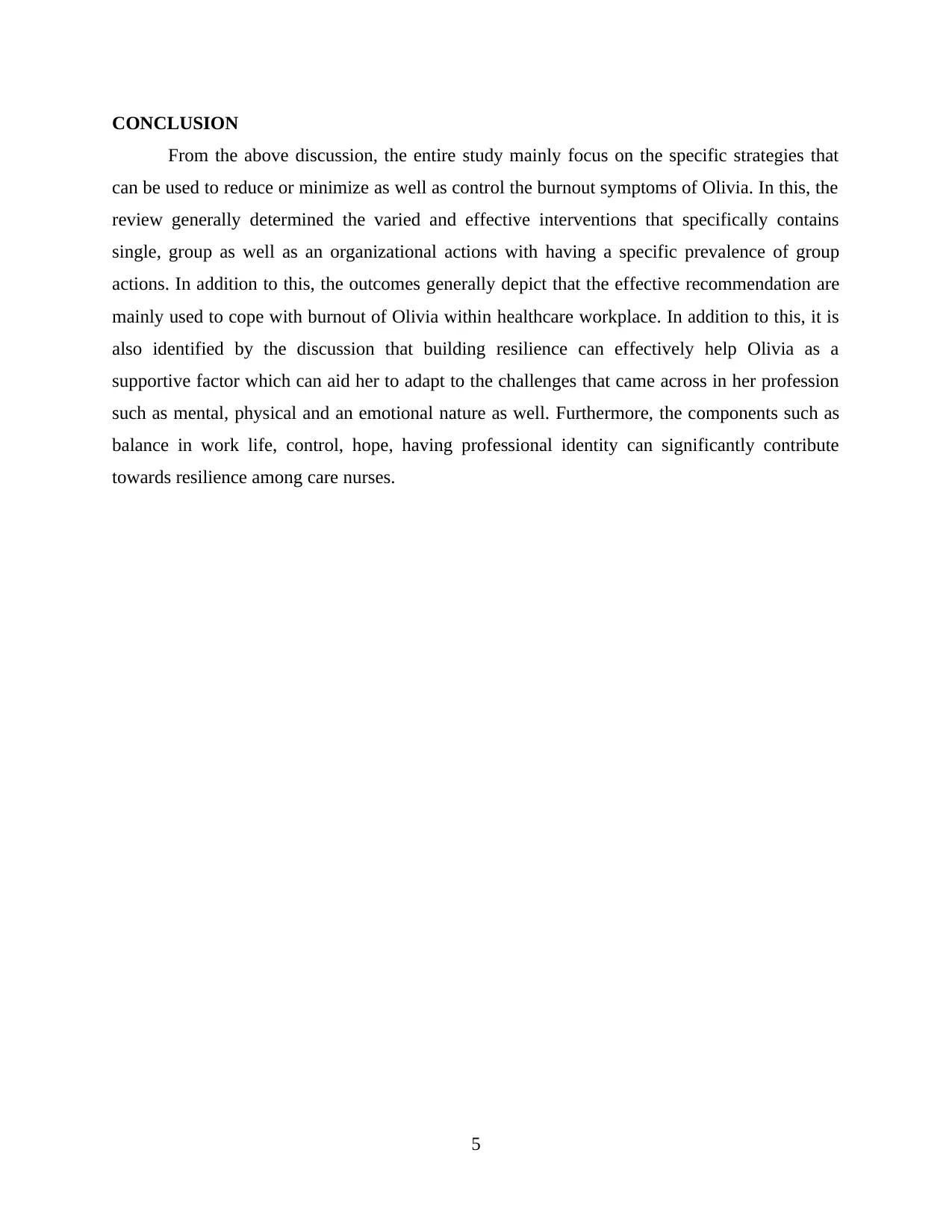
CONCLUSION
From the above discussion, the entire study mainly focus on the specific strategies that
can be used to reduce or minimize as well as control the burnout symptoms of Olivia. In this, the
review generally determined the varied and effective interventions that specifically contains
single, group as well as an organizational actions with having a specific prevalence of group
actions. In addition to this, the outcomes generally depict that the effective recommendation are
mainly used to cope with burnout of Olivia within healthcare workplace. In addition to this, it is
also identified by the discussion that building resilience can effectively help Olivia as a
supportive factor which can aid her to adapt to the challenges that came across in her profession
such as mental, physical and an emotional nature as well. Furthermore, the components such as
balance in work life, control, hope, having professional identity can significantly contribute
towards resilience among care nurses.
5
From the above discussion, the entire study mainly focus on the specific strategies that
can be used to reduce or minimize as well as control the burnout symptoms of Olivia. In this, the
review generally determined the varied and effective interventions that specifically contains
single, group as well as an organizational actions with having a specific prevalence of group
actions. In addition to this, the outcomes generally depict that the effective recommendation are
mainly used to cope with burnout of Olivia within healthcare workplace. In addition to this, it is
also identified by the discussion that building resilience can effectively help Olivia as a
supportive factor which can aid her to adapt to the challenges that came across in her profession
such as mental, physical and an emotional nature as well. Furthermore, the components such as
balance in work life, control, hope, having professional identity can significantly contribute
towards resilience among care nurses.
5
Paraphrase This Document
Need a fresh take? Get an instant paraphrase of this document with our AI Paraphraser
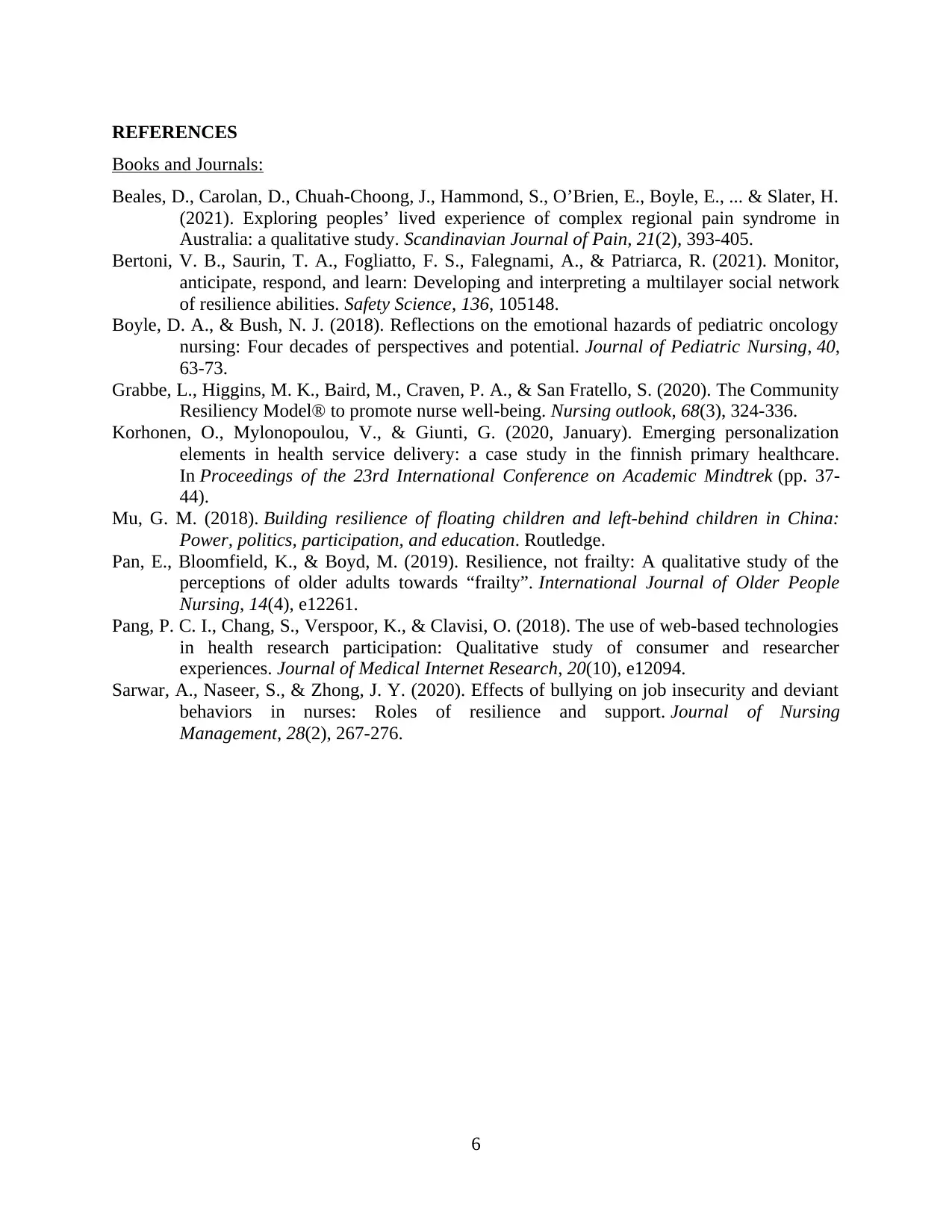
REFERENCES
Books and Journals:
Beales, D., Carolan, D., Chuah-Choong, J., Hammond, S., O’Brien, E., Boyle, E., ... & Slater, H.
(2021). Exploring peoples’ lived experience of complex regional pain syndrome in
Australia: a qualitative study. Scandinavian Journal of Pain, 21(2), 393-405.
Bertoni, V. B., Saurin, T. A., Fogliatto, F. S., Falegnami, A., & Patriarca, R. (2021). Monitor,
anticipate, respond, and learn: Developing and interpreting a multilayer social network
of resilience abilities. Safety Science, 136, 105148.
Boyle, D. A., & Bush, N. J. (2018). Reflections on the emotional hazards of pediatric oncology
nursing: Four decades of perspectives and potential. Journal of Pediatric Nursing, 40,
63-73.
Grabbe, L., Higgins, M. K., Baird, M., Craven, P. A., & San Fratello, S. (2020). The Community
Resiliency Model® to promote nurse well-being. Nursing outlook, 68(3), 324-336.
Korhonen, O., Mylonopoulou, V., & Giunti, G. (2020, January). Emerging personalization
elements in health service delivery: a case study in the finnish primary healthcare.
In Proceedings of the 23rd International Conference on Academic Mindtrek (pp. 37-
44).
Mu, G. M. (2018). Building resilience of floating children and left-behind children in China:
Power, politics, participation, and education. Routledge.
Pan, E., Bloomfield, K., & Boyd, M. (2019). Resilience, not frailty: A qualitative study of the
perceptions of older adults towards “frailty”. International Journal of Older People
Nursing, 14(4), e12261.
Pang, P. C. I., Chang, S., Verspoor, K., & Clavisi, O. (2018). The use of web-based technologies
in health research participation: Qualitative study of consumer and researcher
experiences. Journal of Medical Internet Research, 20(10), e12094.
Sarwar, A., Naseer, S., & Zhong, J. Y. (2020). Effects of bullying on job insecurity and deviant
behaviors in nurses: Roles of resilience and support. Journal of Nursing
Management, 28(2), 267-276.
6
Books and Journals:
Beales, D., Carolan, D., Chuah-Choong, J., Hammond, S., O’Brien, E., Boyle, E., ... & Slater, H.
(2021). Exploring peoples’ lived experience of complex regional pain syndrome in
Australia: a qualitative study. Scandinavian Journal of Pain, 21(2), 393-405.
Bertoni, V. B., Saurin, T. A., Fogliatto, F. S., Falegnami, A., & Patriarca, R. (2021). Monitor,
anticipate, respond, and learn: Developing and interpreting a multilayer social network
of resilience abilities. Safety Science, 136, 105148.
Boyle, D. A., & Bush, N. J. (2018). Reflections on the emotional hazards of pediatric oncology
nursing: Four decades of perspectives and potential. Journal of Pediatric Nursing, 40,
63-73.
Grabbe, L., Higgins, M. K., Baird, M., Craven, P. A., & San Fratello, S. (2020). The Community
Resiliency Model® to promote nurse well-being. Nursing outlook, 68(3), 324-336.
Korhonen, O., Mylonopoulou, V., & Giunti, G. (2020, January). Emerging personalization
elements in health service delivery: a case study in the finnish primary healthcare.
In Proceedings of the 23rd International Conference on Academic Mindtrek (pp. 37-
44).
Mu, G. M. (2018). Building resilience of floating children and left-behind children in China:
Power, politics, participation, and education. Routledge.
Pan, E., Bloomfield, K., & Boyd, M. (2019). Resilience, not frailty: A qualitative study of the
perceptions of older adults towards “frailty”. International Journal of Older People
Nursing, 14(4), e12261.
Pang, P. C. I., Chang, S., Verspoor, K., & Clavisi, O. (2018). The use of web-based technologies
in health research participation: Qualitative study of consumer and researcher
experiences. Journal of Medical Internet Research, 20(10), e12094.
Sarwar, A., Naseer, S., & Zhong, J. Y. (2020). Effects of bullying on job insecurity and deviant
behaviors in nurses: Roles of resilience and support. Journal of Nursing
Management, 28(2), 267-276.
6
1 out of 8
Related Documents
Your All-in-One AI-Powered Toolkit for Academic Success.
+13062052269
info@desklib.com
Available 24*7 on WhatsApp / Email
![[object Object]](/_next/static/media/star-bottom.7253800d.svg)
Unlock your academic potential
Copyright © 2020–2026 A2Z Services. All Rights Reserved. Developed and managed by ZUCOL.





